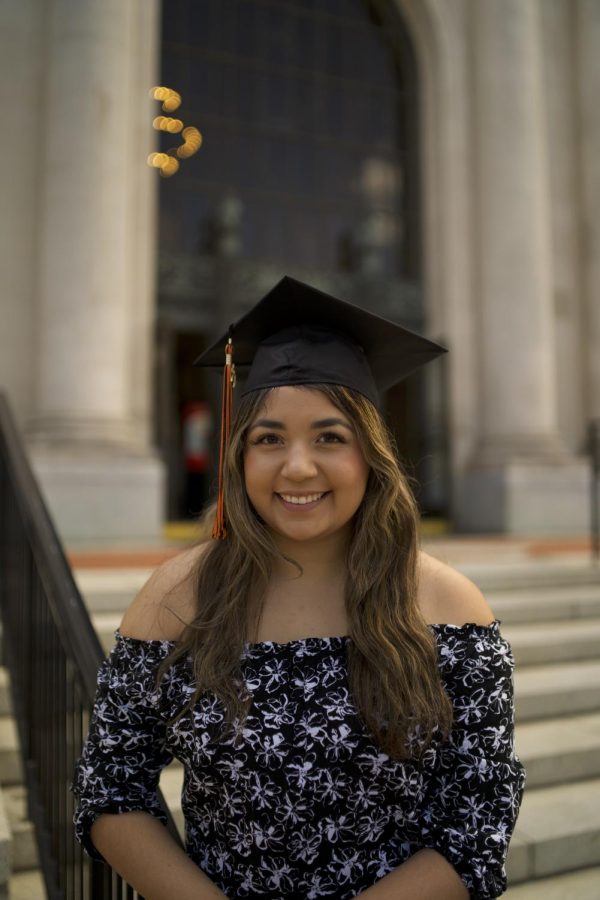First-generation college graduates reflect on time at OSU, offer advice to incoming students
June 7, 2021
Julia Zavala is a first-generation college student graduating this spring from Oregon State University. When reflecting on her experience, Zavala stressed that being the first in her family to go to college means a lot to her.
Zavala, who is majoring in biology with a pre-medicine option, said being the first in her family to graduate college “is very humbling and very important for me to bring pride to my family, especially since my parents labored a lot for me and my siblings to have the best resources to go to college.”
For first generation college graduates, knowing how to navigate college can be a challenge. For these students, it can be difficult to know what resources to seek out and the lack of knowledge about the college experience can make the transition from high school difficult.
Emma Suzuki, a nutrition major with a pre-dietetics option, is also a first-generation college graduate.
According to Suzuki, “It’s really exciting. When you grow up with parents who don’t go to college it’s not necessarily the first thing that you think of,” Suzuki said. “It’s really exciting to have found that path and to have found a passion that I could do by going to school.”
First-generation college students face many challenges that may be foreign to those who have had a parent or grandparent graduate from college.
Zavala said the biggest challenge she faced being a first-generation college graduate “was overall learning what it meant to be in college whether that was applying for financial aid or just applying in general.”
In addition, Zavala said she found adjusting to the world of academia to be a challenge. For example, learning about the proper ways of finding sources and reading scientific literature were all things that Zavala said she “had gotten a glimpse of in high school but not to a great extent.”
While Zavala did not have a parent or grandparent to teach her about the college experience, she said her previous experiences helped her prepare.
“In high school [and] middle school, I was super independent just because my parents had their education in Mexico so they couldn’t help me with any of my classes,” Zavala said.
“So, I was pretty used to kind of figuring things out on my own, but when it came to college, the rigor of that definitely was a challenge.”
According to Suzuki, reaching out for help when necessary helped her overcome some of the challenges associated with being a first-generation college student by utilizing the resources offered on campus.
“If I was unsure about something or had a question about a process or you know anything, I couldn’t just ask my parents ‘what would you do or how does this work?’” Suzuki said. “I had to search and ask professors or advisors or other students who might also know.”
Zavala utilized on-campus resources and found the SI Tables, Science Success Center, attending office hours and going to one of the cultural centers to use their printers to be helpful.
Suzuki said the resources that she found to be most helpful were her advisors.
“I got switched around a couple of them, but they were really helpful and they almost always have the answers,” Suzuki said.
Suzuki said she also utilized the undergraduate writing studio.
“That was really helpful for several papers that I wrote when I was starting out,” Suzuki said. “You know to get a feel of what really counts as a college level paper.”
In addition to the writing studio and her advisors, Suzuki also went to the Mole Hole for chemistry help and the Career Center for resume and interview advice.
While both Suzuki and Zavala found the resources offered on campus to be helpful, both felt that there is more that OSU should offer its students.
Zavala wished she felt more of a sense of community on campus. She said “we are in a predominately white institution so I could probably count with my two hands or less how many students that look like me in my classes.”
Suzuki said she wished that there was better advice for students when taking out loans. “I don’t know that it’s easy to find advice on that. Maybe the financial office would tell you if you asked. But I feel like that could be something that is promoted more.”
“Use the challenges that you are facing in college to drive you to do your best,” Zavala said. “It is going to be rough, it is going to be hard sometimes. You can’t really vent to your family because they don’t really understand it and that’s okay. That’s what friends are for, that’s what teachers are for, that’s what advisors are for. So knowing that you’re not at it alone, that many people before you have been able to do it so you are just as able.”
Suzuki also found reaching out to others to be the best advice she could give to future and current first-generation college students. “I think the biggest advice I could give is don’t be afraid to ask questions,” Suzuki said.
“You know you are totally going to drown and flounder if you don’t ask somebody, anything that you are struggling with. Somebody’s going to know the answer.”




















































































![Newspaper clipping from February 25, 1970 in the Daily Barometer showing an article written by Bob Allen, past Barometer Editor. This article was written to spotlight both the student body’s lack of participation with student government at the time in conjunction with their class representatives response. [It’s important to note ASOSU was not structured identically to today’s standards, likely having a president on behalf of each class work together as one entity as opposed to one president representing all classes.]](https://dailybaro.orangemedianetwork.com/wp-content/uploads/2025/03/Screenshot-2025-03-12-1.00.42-PM-e1741811160853.png)























